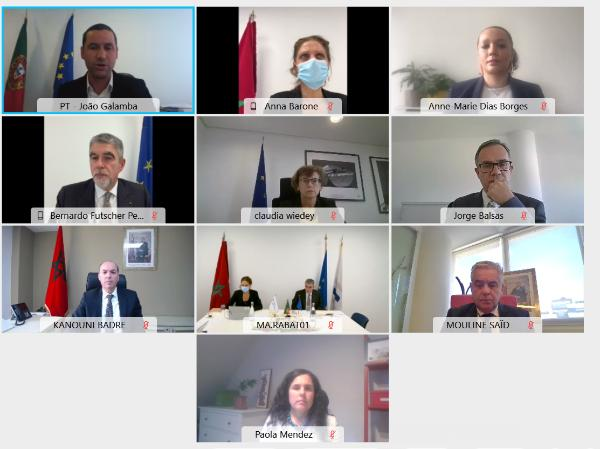
The Portuguese Presidency of the Council of the European Union (EU), in collaboration with the European Investment Bank (EIB), organised a morning of discussion on the energy transition in Africa on Thursday 15 April in Rabat, entitled: “Energy efficiency in social housing and public buildings: opportunities and challenges.” This event was part of the preparation of the High-Level EU-Africa Green Investment Forum, organised jointly by the Portuguese Presidency of the EU and the EIB, which will take place in Lisbon on 23 April 2021, High-Level EU-Africa Green Investment Forum (2021portugal.eu).
The objective of the Rabat Green Talk was to give impetus to Lisbon by engaging in a dialogue on sustainable development solutions in Morocco and Africa, sharing best practices, experiences and innovative approaches. The workshop addressed the issue of energy efficiency in the social housing and public buildings sectors, as well as the challenges and opportunities associated with the use of financial mechanisms, a legislative framework and policies needed to implement the green transition.
The dialogue was opened by Ambassador of the European Union to Morocco Claudia Wiedey, Ambassador of Portugal to Morocco Bernardo Futscher Pereira, and Anna Barone, EIB representative in Morocco. The event brought together representatives from government and the private sector and experts from the energy sector: Portuguese Secretary of State for Energy Joao Galamba, Director-General of the Moroccan Energy Efficiency Agency (AMEE) Saïd Mouline, Engineer in the EIB's Energy Efficiency and Energy Consulting Division Paola Mendez, Chairman of the Management Board of Holding Al Omrane Badr Kanouni, and Director of Casais Maroc Jorge Humberto Ribeiro Balsas.
The participants discussed how to lead the energy transition through dedicated support measures, targeted funding and the highlighting of successful experiences, in order to create jobs and effectively combat the devastating effects of climate change in Africa.
“Over a year ago, we presented the European Green Deal: Europe’s new growth strategy to combine environmental, economic and social sustainability. Energy efficiency is part of the package of strategic initiatives put forward in the Green Deal. In Morocco, the European Union has already supported nine building energy efficiency projects, including four concerning social housing with Al Omrane. More recently, we have supported the creation of training institutes for trades in renewable energies and energy efficiency (IFMEREE) as well as a Morocco-EU twinning programme for setting up training courses and exchanges of experience on energy audits and improving building efficiency and related checks,” said Ambassador of the European Union to Morocco Claudia Wiedey. “We have also just launched a call for projects under the Horizon 2020 research programme to improve the energy efficiency of buildings in Africa and Europe, in partnership with the Moroccan Energy Efficiency Agency and Al Akhawayne University, Ifrane in Morocco. Together we now have a unique opportunity to pursue a green transition and build back better.”
“The energy transition is a key priority for Portugal. We are committed to achieving carbon neutrality by 2050 at the latest thanks to significant investments in recent years in wind, solar, hydroelectric and now green hydrogen energy. It is also an international priority because climate change is a global challenge that we must tackle together. As part of our Presidency of the European Union, we organised the High-Level EU-Africa Green Investment Forum in Lisbon in order to draw attention to the importance of this transition, but also because of the many economic opportunities that it presents,” said Ambassador of Portugal to Morocco Bernardo Futscher Pereira.
“Energy cooperation is a key focus of the strategic relationship between the EU and the Kingdom of Morocco, within the framework of the Green Partnership, particularly in the area of energy efficiency. As the EU climate bank, the EIB is strongly committed to supporting the energy strategy of the Kingdom of Morocco, which focuses in particular on mitigation measures in social housing. Since 2014, the EIB has invested €526 million in renewable energy and energy efficiency in Morocco. Moreover, in 2020 the EIB Group showed that investing in post-COVID economic recovery and climate action were not incompatible, and the share of the EIB Group’s climate and environmental projects increased from 34% to 40% of total financing. To this end, green buildings will be among the next decade's greatest global investment opportunities,” added EIB representative in Morocco Anna Barone.
You can view the livestream on the YouTube page of our partner for the event, Médias24: Energy efficiency in social housing and public buildings: opportunities and challenges
European Investment Bank (EIB)
The EIB has been a key partner for Morocco for 40 years. The EIB finances the development and implementation of key projects in vital sectors of the Moroccan economy such as business support, agriculture, water and sanitation, education, health, transport and even renewable energies.